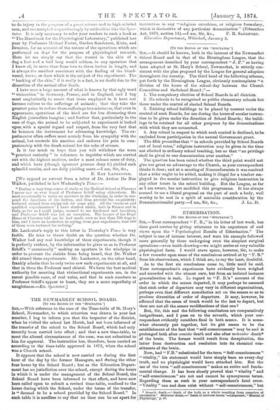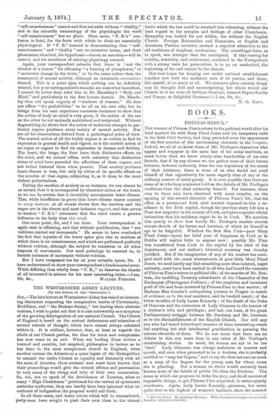ETHERISATION.
[TO TEE EDITOR OF THE "SPECTATOR.")
SIR,—Your correspondent "F. B.," in his letter of last week, has done good service by giving utterance to his experience of and views upon the "Psychological Results of Etherization." The subject is one of intense interest, and were his example followed more generally by those undergoing even the simplest surgical operations—even tooth-drawing—we might arrive at very valuable- physiological facts. I would crave space, however, Sir, to make a few remarks upon some of the conclusions arrived at by "F. B.". from his observations, which I think are, to say the least, doubtful -
As to the first six conclusions come to, little need be said. Your correspondent's experiences have evidently been weighed and recorded with the utmost care, but from an isolated instance- generalisation is rash. In regard to "F. B.'s " account of the order in which the senses departed, it may perhaps be assumed that such order of departure may vary in different organisations, perhaps even that different aniesthetics act on the senses so as to produce diversities of order of departure. It may, however, be- affirmed that the sense of touch would be the last to depart, but then are not all the senses modifications of that one?
But, Sir, this and the following conclusions are comparatively insignificant, and I pass on to the seventh, which your cor- respondent evidently considers final in both senses. It is some- what obscurely put together, but its gist seems to be the establishment of the fact that "self-consciousness" may be and is- prolonged both after somatic death and also after molecular death* of the brain. The former would result from decapitation, the latter from destruction and resolution into it chemical con- stituents of the brain.
Now, had " F.B." substituted for the term " Self-consciousness " "vitality," his statement would have simply been an every-day truth, and no physiologist would have attacked him. Bat the use of the term " self-eonscionsness " makes an entire and funda- mental change. It has been clearly proved that "vitality " and "self-consciousness" are not and cannot be synonymous terms. Regarding them as snob is your correspondent1/2 fatal error. "Vitality" can and does exist without "self-consciousness," but • Somatic death,—" death of the body as a whole resulting frem cessation of .circulation." Molecular death,—" death of nervous tissue."-.Carpenter, Manual of Physiology," p. 40. " self-consionsness " cannot and does not exist without "vitality," and in the scientific terminology of the physiologist the word 4' self-consciousness" has no place. Once more, "F. B.'s " con- fusion is fatal, for the facts with which he deals are essentially physiological. If "F. B." succeed in demonstrating that " self- consciousness " and "vitality " are co-extensive terms, and their phenomena identical, his hypothesis—almost an assertion—will be -correct, and his overthrow of existing physiology assured.
Again, your correspondent submits that there is "not the shadow of a reason" for affirming "a burning of phosphorus," or 4' molecular change in the brain," to be the cause rather than the consequent of mental activity, although an invariable concomitant thereof. This is a point upon which nothing can be definitely uttered, but your correspondent's remarks are somewhat hazardous. I cannot do better than refer him to Dr. Maudsley's "Body and Mind," and particularly to the first lecture therein. Dr. Mends- ley does not speak vaguely of "shadows of reasons." He does not affirm "the probabilities" to be all on his own side, but he brings from his vast experience numerous instances to ehow that the action of body on mind is very great, if the action of the one on the other be not mutually maintained and reciprocal. Without dogmatising, he shows how the action of molecular changes in par- ticular organs produces every variety of mental activity. Nor are all his observations derived from a pathological point of view. The normal action of all the bodily organs is as certain to find its expression in general health and vigour, as is the morbid action of an organ or organs to find its expression in disease and debility. The heart, the lungs, the liver have their distinctive effects on -the mind, and we cannot affirm with certainty that distinctive states of mind have preceded the affections of these organs, and not rather fostered them when present. That anxiety produces heart-disease is true, but only by virtue of its specific effects on the muscles of that organ, subjecting it, as it does, to the most violent perturbations.
Taking the emotion of anxiety as an instance, we can almost be as certain that it is accompanied by abnormal action of the heart, as we can be certain that it invariably accompanies heart-disease. This, while insufficient to prove that heart-disease causes anxiety in every instance, at all events shows that the emotion and the -organ are in the closest and most intimate rapport, and thus serves to weaken "F. R's" statement that the mind exerts a greater influence on the body than vice versa.
One more point, Sir, and I am done. Your correspondent is again rash in affirming, and that without qualification, that "our volitions control our movements." He seems to have overlooked the fact that injuries of the lower spine give rise to motions of which there is no consciousness, and which are performed perfectly without volition, although the subject be conscious in all other -respects of movements. Nor need pathology be resorted to, to furnish instances of movement without volition.
But I have trespassed too far on your valuable space, Sir. I have endeavoured to show your correspondent's fundamental error. While differing thus wholly from "F. B.," lie deserves the thanks -of all interested in science for his most interesting letter.—I am,











































 Previous page
Previous page